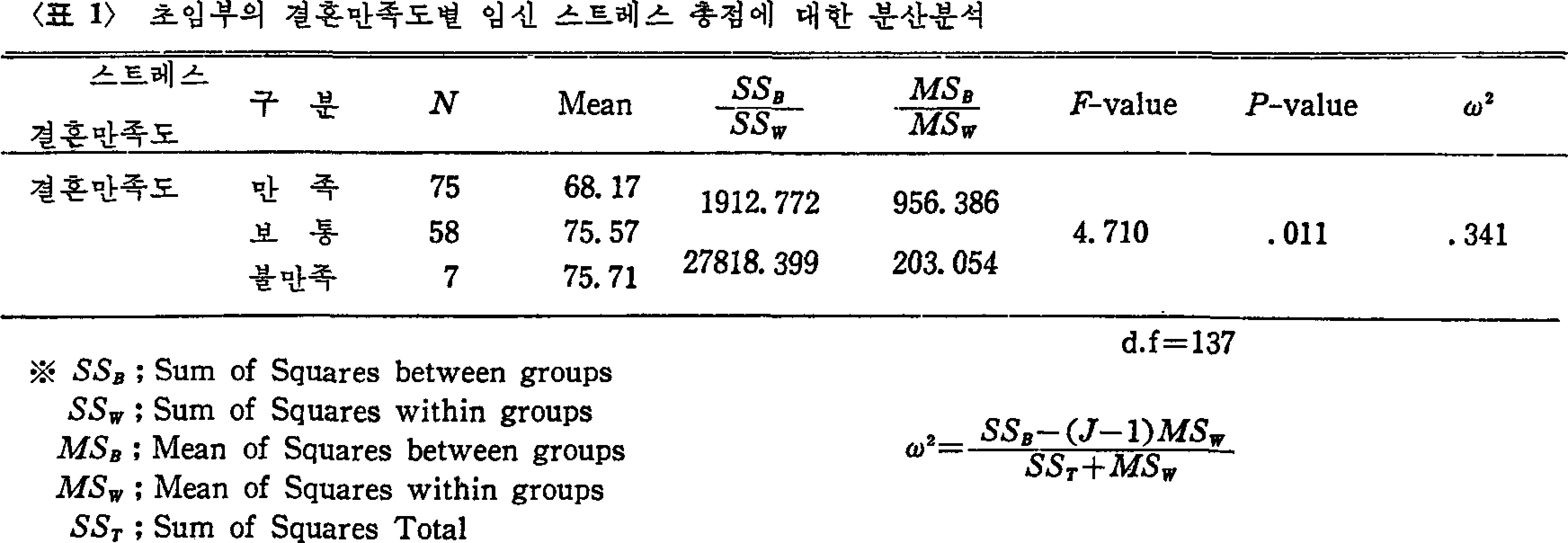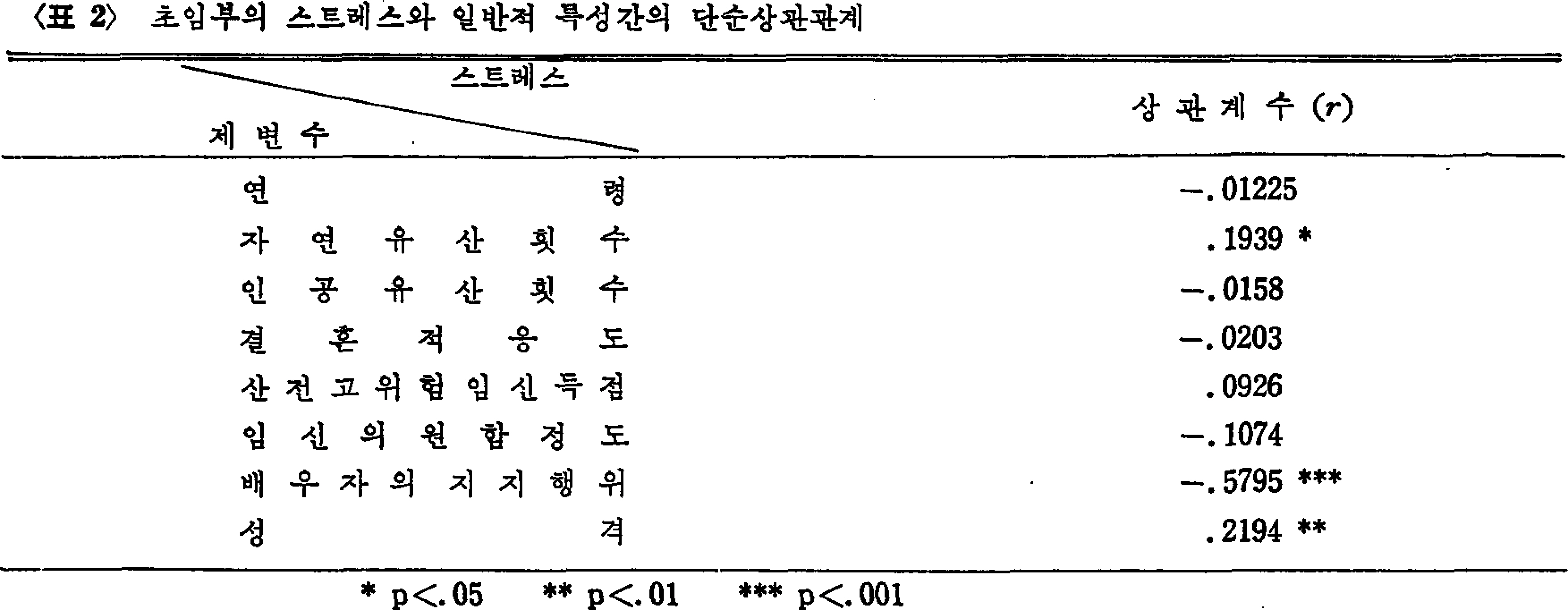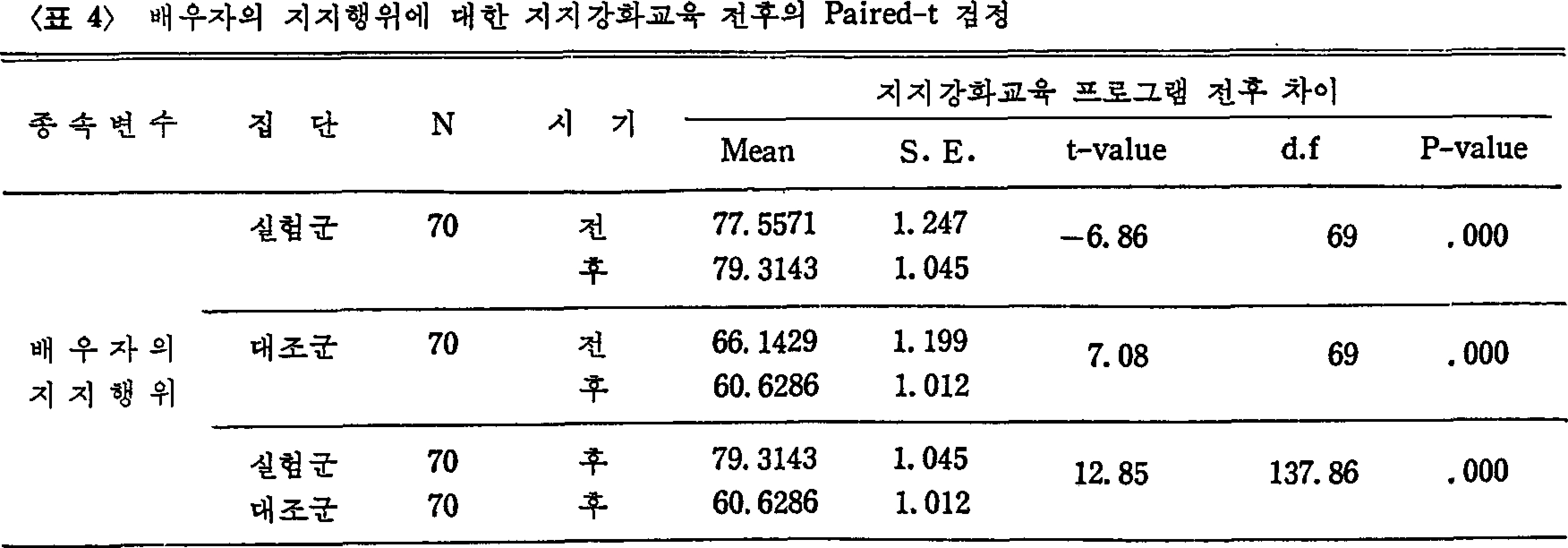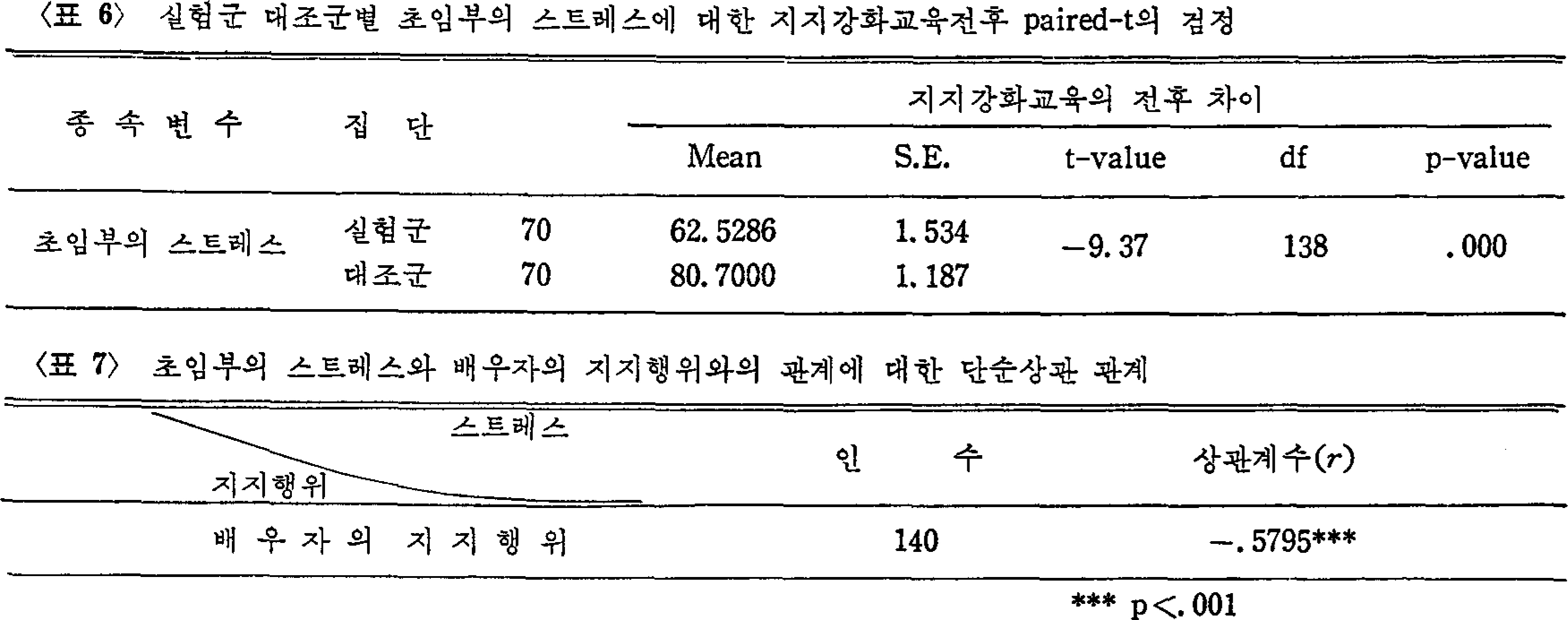Articles
- Page Path
- HOME > J Korean Acad Nurs > Volume 15(1); 1985 > Article
-
Original Article
- An experimental study of the effects of husband's supportive behavior reinforcement education on stress relief of primigravidas.∗
- Ahn Hwang-Lan
-
The Journal of Nurses Academic Society 1985;15(1):5-16.
DOI: https://doi.org/10.4040/jnas.1985.15.1.5
Published online: December 18, 1985
1Dept. of Nursing, Gyeongsang National University
Copyright © 1985 Korean Society of Nursing Science
This is an Open Access article distributed under the terms of the Creative Commons Attribution Non-Commercial License (http://creativecommons.org/licenses/by-nc/3.0) which permits unrestricted non-commercial use, distribution, and reproduction in any medium, provided the original work is properly cited.
- 826 Views
- 12 Download
- 27 Crossref
Abstract
-
- This study examined the effects of husband's supportive behavior reinforcement education on stress relief of primigravidas. The purpose was to reinforce husbands’ supportive behavior and relieve primigravidas’ stress.
- The purposes of this study were to determine factors influencing Primigravidas∗ stress and the effect of husbands’ supportive behavior reinforcement education on stress relief of primigravidas.
- The subjects, consisting of 140 primigravidas who registered or visited in three obstetrics and gynecology clinics in J city, were divided into at random experimental and control groups. Data were collectpe from April To July, 1984 through interviews during hospital visits, and by questionaires.
- The husbands’ supportive behavior reinforcement education and the measurement tools were developed by the investigator from the literature and during pilot study: the instruments to measure primigravidas∗ stress and husbands’ supportive behavior were tested for reliability and validity.
- Personality characteristisc were measured by Chestnuts’ Stress Management instrument. T-test, ANO- VA, ω2、and Pearson. Correlation were used in analyzing the data to confirm the intensity of the influence and the relation between general characteristics and primigravidas’ stress. Pearson correlation and Stepwise Multiple Regression were used to confirm the predictors of primigravidas’ stress. Independent variables were compared by means of t-test and xs- test to confirm significant discrepancy of experimental and control groups. T-test, paired t-test, pearson correlation were used in analyzing the data to confirm the effect of husband's supportive behavior reinforcement education on stress relief of primigravidas.
- The results of the study are summarized.
- Results from analyzing the effect of husbands’ supportive behavior reinforcement education: There was no significant difference between the general characteristics of the experimental and control groups. And husbands∗ supportive behavior, personality, marital Satisfaction, natural abortion variables influenced at primigravidas’ stress.
- A hypothetical test by comparative analysis of the measurement of primigravidas’ stress and husbands’ support behavior between the experimental and the control group before and after the experiment to confirm the effect of husbands’ supportive behavior reinforcement education resulted in the following:
- The first hypothesis that husbands’ supportive behavior reinforcement education will increase husbands’ support behavior to relieve primigravidas’ stress was supported.
- The second hypothesis that husbands’ supportive behavior reinforcement education will relieve primigravidas1 stress was supported. As a result, it was shown that husbands’ supportive behavior reinforcement education relieved primigravidas’ stress, and the hypotheses were supported.
- The third hypothesis that the higher the degree of husbands’ supportive behavior, the lower the primi- gravidas’ stress was supported.
- It was concluded that husbands’ supportive behavior reinforcemen education increase husbands’ supportive behavior and relieves Primigravidas’ stress.
- < 단행본〉강두희, 생리학(서울: 신광출판사: 1981)..
- 김수지, 김정인: 가족정신건강(서울: 수문사: 1981)..
- 김원경: 행동과학(서울: 박영사: 1976)..
- 매혜영: 간호조산학(서울: 일신부인병원: 1978)..
- 이경헤, 조미영: 고위험모성간호학(서울: 수문사, 1981)..
- 웨인엔더슨저: 안신영역: 가정생활설계(서울: 한국기독교석회, 1972)..
- 최연순, 조회숙: 장춘자, 모성간호학(서울: 수문사: 1980)..
- 최재석: 현대가족연구(서울: 일지사: 1982)..
- 하영수: 산소아과간호학(서울: 수문사: 1975)..
- 한동세: 정신과학(서울: 일조각: 1977)..
- Abbey, J.C.'“A General Systems Approach to Nursing,” Improvement of Curricular in schools of Nursing (ed. J. Smith), Boulder, (Colo: Western Interstate Commission for Higher Education, 1970)..
- Ackerman N.W., The Psychodynamics of Family L//e(New York: Basic Books, 1958)..
- Aid이is, J., Family problem iSo/w'wg-(Hinsdale: The Dryden Press Inc., 1971)..
- Anderson, B.A., Pregnancy and Family Health (New York: McGraw-Hill Book Company, 1974)..
- Anderson, B.A., Camacho, M.E.'and Stark, J., Pregnancy and Family Heaitk(New York: McGraw- Hill Book Company, 1974)..
- Appley, M.H., Trumball, R.(ed.)'Psychological Stress, (New York: Appleton-Centry-Crafts, 1967)..
- Baber, R.E., Marriage and the Family(New York: McGraw-Hill Book Company, Inc., 1953)..
- 〈논문및정기간행문.
- 김의숙: ”부부의조화도가그들의건강에미치는영향.” 간호학논집: 제5집(1981): 연세대학교간호학찌구소..
- 겅조자, “환자스트레스와가족의방문에관한실증적연구”(박사학위논문: 연세대학교대학원: 1983)..
- 문영숙: “분만의정상경과에관한산전교육이초임부의상태불안에미치는영향에관한연구”(석사학위논문, 이화여자대학교대학원: 1980)..
- 박인덕, “아내가기대하는남편의역할조사.” 숙명여대아세아여성문제연구소: 제16집(1977)..
- 이태현, “한국기혼여성의배우자의가족관계고찰” 가정학회지: 제6 권(1968)..
- 조두영: ”임신기심리와성생활”: 진단과치료: 2권3 호, (1982)..
- 조은숙: “임신부심리검사”: 아세아여성연구: 제2 집: (1963)..
- Barash, D.A., “Dynamics of the Pathological Family System'” Psychiatric Care, Vol. 17, No. 1 (1979), pp. 17 - 24..
- Belsky, J.'Spanier, G.B., Rovine, M.'“Stability and Change in Marriage Across the Transition to Parenthood,” Journal of Marriage And the Family, Vol. 45, No. 3: (August'1983), pp. 567-572..
- Breen, D., “The birth of the first Child,” Towards an Understanding of femininity London University Press, 1975..
- Bruner, J.S., Toward a theory of instraction(Cam. bridge, Mass: Havard University Press, 1966)..
- Bryans, F.E. and Belither, Α., “17-Hydro corticostr- eoids level in pregnancy,” American Journal of Obstetrics and Gynecology, (1961): pp.42-52..
- Cobb, S., “Social Support as a Moderator of Life Stress,” Psychosomatic Medicine, Vol. 38, No. 5, (September-October, 1976), pp. 300-314..
- Cohn, L., “Coping with Anxiety: A Step-By Step Guide,” Nursing 79 (December, 1979), pp. 34-37..
- Doering'Susan G.'Entwisle, Doris, R.'“Preparation During Pregnancy and Ability to Cope with Labor and Delivery,” American Journal Orthopsyckiat, Vol. 45: No. 5 (October, 1975), pp. 825-837..
- Dooher, Mary E., “Lamaze Method of Childbirth,” Nursing Research, Vol. 29: No. 4 (July, 1980): pp. 220- 224..
- Ferreira, A.J., “Emotional Fuctors in Prenatal Envi- rnment,” The Journal of Nervous and Mental Disease, Vol. 141, No. 1,(1965): pp. 108- 114..
- Gardner, K.G., “Supportive Nursing: Ά Critical Review of the Literature,” JPN and Mental Health Service, Vol. 17, No. 10'(October, 1979), pp.10-15..
- Gemzell, C.A., “Blood levels of 17ᅳHydroxycorticos- teroids in Normal Pregnancy, ” The Journal of limical Endocrinology and Metabolism, August, 1953), pp. 898-902..
- Moss, F. T.: Meyer, B., “The Effects of Nursing Interaction upon pain Relief in Patients,” Nursing Research Vol. 15'No. 4 (Fall, 1966), pp. 303-306..
- Neal, M.E., “Theory and Experiment relation Psychoanalytic displacement to stimulus response generalization,” Journal of Abnormal Social Psychology, Vol. 43: (1948): p. 402..
- Norbeck'J.S.'“Social Support; A Model for clinical Research and Application, ” Advences in Science, (July, 1981), pp. 43-59..
- Obrzut, L., “Expectant fathers perceptions of fathering,” American Journal of Nursing, (1976), pp. 1440-1442..
- Panzarine, S.'Elster, A.B.'“Prospective Adolescent Fathers: Stresses during Pregnancy and implications for nursing intervention,” JPNMHS, Vol. 20: No. 7: (July, 1982), pp. 21-23..
- Parad, H.J.'Caplan, G., “A Framework for Studying Families in Crisis,” Thesretical Foundations for Nursing, pp. 362-374..
- Patkai, P., “Laboratory Studies of Psychological Stress,” International Journal of Psychiatry in Medicine, Vol. 5, No. 4 (1974): pp. 575-85..
- Pierce, L.M., “Usefulness of a systems approach for problem Conceptualization and Investigation,” Nursing Research, Vol. 21: No. 6 (1972)..
- Porter, L.S., & Demeuth, B.R, “The impact of marital adjustment on pregnancy acceptance,” Maternal and ChildNursing Journal, (Summer'1978), pp. 103 - 113..
- Rindfuss, R.R., John, C.S., “Social Determinants of Age at First Birth,” Jounal of Marriage and Family, Vol. 29, No. 3, (August, 1983), p. 553..
REFERENCES
Figure & Data
REFERENCES
Citations
Citations to this article as recorded by 

- Effects of Mat and Reformer Pilates Exercise Program on Lower Extremity Edema and Stress, Depression in Pregnant Women in the Second Trimester
Jin-Eun Koo, Kyoung-Bin Min
The Asian Journal of Kinesiology.2025; 27(3): 44. CrossRef - Assessing the influence of forest therapy on maternal health: a medical perspective and recommendations
Kyung Ju Lee
Journal of the Korean Medical Association.2024; 67(1): 38. CrossRef - Are the effects of stress on antenatal depression mediated by self-esteem and moderated by social support?: a cross-sectional study
Eunjoo Lee
Women's Health Nursing.2024; 30(4): 299. CrossRef - Psychosocial factors associated with health behaviors in pregnant women of advanced maternal age in Korea
Songi Jeon, Wonjung Noh
Frontiers in Public Health.2023;[Epub] CrossRef - Evaluating the Reliability and Validity of the Korean Version of the Pandemic-Related Pregnancy Stress Scale
Mi-Eun Kim, Myoung-Lyun Heo
Risk Management and Healthcare Policy.2023; Volume 16: 655. CrossRef - Comparison of factor structures of the Pittsburgh sleep quality index between mid- and late pregnancy among Korean women: a cross-sectional study
Hyejung Lee, Ki-Eun Kim, Mi-Young Kim, Chang Gi Park
BMC Pregnancy and Childbirth.2022;[Epub] CrossRef - Influence of Fetal Attachment and Pregnancy Stress on Health Promotion Behavior in Primigravida
Soo Rueng Yeo, So Young Choi
Journal of The Korean Society of Maternal and Child Health.2022; 26(4): 270. CrossRef - Cluster Analysis of the Combined Association of Sleep and Physical Activity with Healthy Behavior and Psychological Health in Pregnant Women
Hyejung Lee, Ki-Eun Kim, Mi-Young Kim, Chang Gi Park
International Journal of Environmental Research and Public Health.2021; 18(4): 2185. CrossRef - Effects of the Unpleasant Symptom-Relief Program on Preterm Labor Stress, Anxiety, Physical Discomfort, and Situational Discomfort among Hospitalized High-Risk Pregnant Women: A Nonrandomized Controlled Trial
Guy Nam Kim, Eun-Young Jun
Journal of The Korean Society of Maternal and Child Health.2021; 25(4): 269. CrossRef - Effects of Social Support, Pregnancy Stress, and Anxiety on Health-Related Quality of Life in Pregnant Women
Hyun Jung Kim, Hee Sun Kang
Korean Journal of Stress Research.2021; 29(2): 140. CrossRef - The Mediating Effect of Marital Intimacy on the Relationship between Spouse-Related Stress and Prenatal Depression in Pregnant Couples: An Actor–Partner Interdependent Model Test
Miyoung Lee, Yeon-Suk Kim, Mi-Kyoung Lee
International Journal of Environmental Research and Public Health.2021; 18(2): 487. CrossRef - Trajectories of Depressive Symptoms and Anxiety during Pregnancy and Associations with Pregnancy Stress
Hyejung Lee, Ki-Eun Kim, Mi-Young Kim, Chang Gi Park, Jung Yeol Han, Eun Jeong Choi
International Journal of Environmental Research and Public Health.2021; 18(5): 2733. CrossRef - Effects of a labour and delivery simulated practice programme for elderly primigravidas
Chun hee Seong, Kyung min Park, Kyoung ja Moon
Nursing Open.2020; 7(3): 776. CrossRef - Do the Emotions of Middle-Income Mothers Affect Fetal Development More Than Those of High-Income Mothers?—The Association between Maternal Emotion and Fetal Development
Dasom Kim, Insook Lee, Kyung-Sook Bang, Sungjae Kim, Yunjeong Yi
International Journal of Environmental Research and Public Health.2019; 16(11): 2065. CrossRef - Risk Factors for Premature Birth among Premature Obstetric Labor Women: A Prospective Cohort Study
Yun Kyung Kim, Kyung Hee Lim
Korean Journal of Women Health Nursing.2018; 24(3): 233. CrossRef - Effects of an Experience-focused Prenatal Program on Stress, Anxiety, Childbirth Confidence, and Maternal-Fetal Attachment on Women in Their First Pregnancy
Mira Park, Sunok Lee
Korean Journal of Women Health Nursing.2018; 24(2): 126. CrossRef - Multiple Factors in the Second Trimester of Pregnancy on Preterm Labor Symptoms and Preterm Birth
Jeung-Im Kim, Mi-Ock Cho, Gyu-Yeon Choi
Journal of Korean Academy of Nursing.2017; 47(3): 357. CrossRef - Effects of Aroma Inhalation Therapy on Stress, Anxiety, Depression, and the Autonomic Nervous System in High-risk Pregnant Women
Gee Youn Go, Hyojung Park
Korean Journal of Women Health Nursing.2017; 23(1): 33. CrossRef - Development of a Prediction Model for Postpartum Depression: Based on the Mediation Effect of Antepartum Depression
Eun Joo Lee, Jeong Sook Park
Journal of Korean Academy of Nursing.2015; 45(2): 211. CrossRef - Relationship between Fatigue, Sleep Disturbance, and Gestational Stress among Pregnant Women in the Late Stages
Mi-Young Chung, Kyung-Hye Hwang, Ok-Hee Cho
Korean Journal of Women Health Nursing.2014; 20(3): 195. CrossRef - Factors of Prenatal Depression by Stress-vulnerability and Stress-coping Models
Younglan Kim, Chae Weon Chung
Korean Journal of Women Health Nursing.2014; 20(1): 38. CrossRef - Stress, Depression, and Fetal Attachment in Pregnant Women having Infertility Treatments
Miok Kim
Korean Journal of Women Health Nursing.2014; 20(2): 163. CrossRef - Post‐partum blues among Korean mothers: A structural equation modelling approach
Sung Suk Chung, Il Young Yoo, Kyoung Hwa Joung
International Journal of Mental Health Nursing.2013; 22(4): 359. CrossRef - Effects of a Yoga-focused Prenatal Program on Stress, Anxiety, Self Confidence and Labor Pain in Pregnant Women with In Vitro Fertilization Treatment
Chung Sin Shim, Young-Sook Lee
Journal of Korean Academy of Nursing.2012; 42(3): 369. CrossRef - Factors associated with Maternal-fetal Attachment of Expectant Mothers Whose Fetus Has a Prenatal Diagnosis of Congenital Heart Disease
Yu-Mi Im, Eun-Sook Kim, Il-Young Yoo
Journal of Korean Academy of Child Health Nursing.2012; 18(3): 150. CrossRef - Psycho-social Factors Associated with Depression in Pregnant Women
Myoung Eun Lee, Young Ran Kweon
Journal of Korean Academy of Psychiatric and Mental Health Nursing.2011; 20(3): 252. CrossRef - Change of Stress and Nursing Needs after Hospitalization in Preterm Labor Women
Min Kyeong Kim, Young Whee Lee, In Sook Cho, Ji Young Lim
Korean Journal of Women Health Nursing.2009; 15(1): 24. CrossRef
An experimental study of the effects of husband's supportive behavior reinforcement education on stress relief of primigravidas.∗
An experimental study of the effects of husband's supportive behavior reinforcement education on stress relief of primigravidas.∗
 KSNS
KSNS
 E-SUBMISSION
E-SUBMISSION






 Cite
Cite

